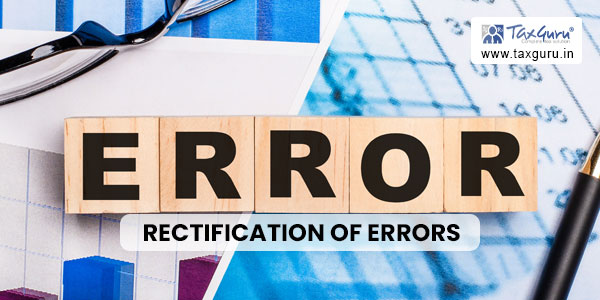The Indian Goods and Services Tax (GST) system, implemented under the CGST Act, 2017, aims to simplify and streamline the taxation process. However, like any complex legal framework, it’s not immune to errors or mistakes. That’s where GST Section 161 comes into play. This provision serves as a safeguard against inaccuracies in GST-related decisions, orders, summons, notices, or certificates.
Understanding the Purpose of Section 161
GST Section 161 is a vital component of the CGST Act, 2017, and it revolves around the rectification of errors or mistakes identified in the GST records. Essentially, it empowers the authority responsible for issuing various documents, including decisions, orders, summonses, notices, and certificates, to rectify any mistakes discovered within these records.
Now, let’s break down the key aspects of this provision:
Rectification Authority
Rectifications under Section 161 can be initiated in three distinct ways:
- Suo Moto: In this scenario, the relevant authority can take the initiative to rectify an error without any external prompting.
- Upon Notice: If an affected individual notices an error in a document, they have the right to request rectification by notifying the authority responsible.
- GST Officials’ Notice: GST officials, both at the Central and State levels, have the authority to prompt rectifications when they come across errors in GST records.
Deciphering “Error Evident on the Face of Records”
One crucial aspect of Section 161 revolves around the concept of an “error evident on the face of records.” While the GST legislation doesn’t offer a precise definition for this term, it broadly encompasses three categories of errors:
i. Errors in Law: These errors relate to the misapplication or misinterpretation of legal provisions. For instance, if a decision neglects to consider a crucial legal provision, it qualifies as an error in law.
ii. Errors in Fact: These errors pertain to factual inaccuracies in the documents. When a document contains factual errors, such as incorrect data or misrepresented information, it falls under this category.
iii. Clerical or Arithmetic Errors: Simple miscalculations, typographical errors, or clerical mistakes also come under the purview of Section 161. These errors are often rectified with straightforward corrections.
Errors that are apparent, obvious, and discernible from the document itself are considered errors evident on the face of records and can be addressed through Section 161. However, errors that involve questionable or arguable elements require supporting evidence and do not fall within the scope of apparent errors.
For instance, if a proper officer disregards documents submitted by a taxpayer during the issuance of an order, it constitutes an error of fact and can be rectified under Section 161. Similarly, not taking relevant legal regulations into account is classified as an error of law and can be addressed under the same provision.

Drawing Insights from Section 154 of the Income Tax Act
To gain a deeper understanding of what constitutes a “mistake” from a legal perspective, it’s helpful to reference Section 154 of the Income Tax Act. This section outlines various scenarios that qualify as mistakes, including:
- Misreading a Clear Provision: When an authority misinterprets or misapplies a clear provision, it amounts to an error.
- Applying an Inapplicable Provision: Using a provision that is not relevant to the situation at hand is considered an error.
- Ignoring Mandatory Provisions: Errors can also occur when mandatory provisions are ignored.
- Application of an Incorrect Provision of the Act: Utilizing an incorrect provision from the Act leads to mistakes.
- Disregard of Decisions by Jurisdictional High Court: Ignoring decisions made by the jurisdictional High Court is another scenario where errors can surface.
Understanding Time Limits for Rectification
Rectification authority is not solely vested in GST officials; taxpayers also have the right to seek rectification. However, there’s an important time constraint. Taxpayers must initiate the rectification process within three months from the date of the order’s issuance.
GST Section 161 also sets a timeline for issuing rectification orders. It mandates that rectification orders must be passed within six months from the date of the original order, decision, notice, certificate, or any other relevant document. It’s worth noting that this six-month limit is not applicable when rectifying clerical or arithmetic mistakes caused by unintentional slips or omissions.
In Summary
In summary, GST Section 161 provides an essential legal recourse for individuals affected by erroneous GST orders or decisions. It allows for the rectification of errors that are apparent on the face of records. If an application for rectification is denied or deemed unsatisfactory, individuals can file an appeal under Section 107 of the CGST Act, 2017, before the appellate authorities.
Additionally, under GST Rule 142(7), when rectification is required under Section 161 or when an uploaded order on the portal is withdrawn, the proper officer must electronically upload an abstract of the rectification or withdrawal order using Form GST DRC-08. This form includes details about the original order, the rectification order, and a summary of the original claim and demand post-rectification.
Disclaimer: This article serves as informational content and should not be considered as legal advice. Always consult with a qualified legal professional for specific GST-related matters. Understanding GST Section 161 and its nuances is crucial for both taxpayers and GST officials, as it provides a mechanism to correct errors and ensure the integrity of the GST system.





